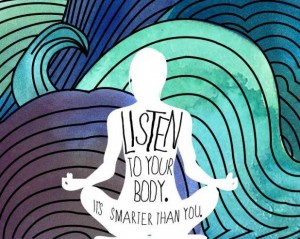by Cynthia Bischoff | Oct 22, 2016 | Heartliving
 Today, many of us are aligned with our intellects, living almost exclusively in our heads, while our bodies are encased in layers of armor or tension. The body seems merely to transport the intellect from place to place.
Today, many of us are aligned with our intellects, living almost exclusively in our heads, while our bodies are encased in layers of armor or tension. The body seems merely to transport the intellect from place to place.
- The body is actually a reflection of the soul and has much to tell us about our mind and spirit. The soul’s essence is “connectedness” and our souls and hearts thrive on relationship. Ancient people knew this instinctively. Their survival depended upon their relationship to their environment, to each other, and to their bodies.
- As early as childhood, we learn to subjugate painful emotional events. These emotional traumas that the mind forgets are stored in the body in what is called “cellular memory.” We learn to dismiss or cut off signals from the body that remind us of painful experiences.
- As adults we too often ignore our bodies because the messages interfere with our daily routines. Our bodies contain a great deal of essential, natural wisdom about when to rest and when to act if we will just listen to its symptoms and sensations.
By listening to the body’s signals and rhythms we can come to full awareness and thus heal our past.
by Cynthia Bischoff | Oct 2, 2016 | Heartliving
 Join me at 6:00 pm, on October 25, 2016, at the Sentara Virginia Beach General Hospital-Education Center, Virginia Beach, VA, for an enlightening seminar on heart health, Getting To The Heart Of Your Health. During my 2 hour presentation, sponsored by Deepak Tareja MD, Cardiovascular Associates, I will guide you through powerful principles for creating excellent health and help you contribute to your overall well-being by understanding:
Join me at 6:00 pm, on October 25, 2016, at the Sentara Virginia Beach General Hospital-Education Center, Virginia Beach, VA, for an enlightening seminar on heart health, Getting To The Heart Of Your Health. During my 2 hour presentation, sponsored by Deepak Tareja MD, Cardiovascular Associates, I will guide you through powerful principles for creating excellent health and help you contribute to your overall well-being by understanding:
- The power of your mind in creating a healthy body
- Healthy habits to create physical harmony
- Ways to implement keys to greater health & balance
- Techniques for generating wellness!
- Seminar includes a handout for easy reference of healing concepts.
The seminar fee is $25.00. Spaces are limited and selling quickly. If you’re ready to improve your health now, click Register.
by Cynthia Bischoff | Sep 25, 2016 | Heartliving
 At varying times in our lives, we arrive at a place in our psychological/spiritual development in which we begin to feel that our outer world may not be supporting our inner world. This causes us to pay attention and make changes.
At varying times in our lives, we arrive at a place in our psychological/spiritual development in which we begin to feel that our outer world may not be supporting our inner world. This causes us to pay attention and make changes.
When we reach these junctures, certain feelings may arise:
- we may feel unfulfilled or bored;
- we may find that we have unrealistic expectations;
- we may have an overly negative attitude;
- we may feel uninterested in our life situation;
- we may have work or family difficulties that were not expected.
It is at these times that we are often ready for change or what has been termed a “rebirth.” Our old compasses may no longer work and the new compass needs to be held differently. It may be a time to revisit our intentions and goals in order to course correct.
Also, throughout our lifetime, we must recognize that things cannot stay the same. Part of life involves change and growth. How else are we to learn?
So we can ask ourselves some questions:
- “How might I see or participate in my current circumstances differently?”
- “What am I avoiding feeling or doing and how might I embrace this?”
- “Am I willing to change, and if so, how?”
- “What have I not yet ‘become’ and am I willing to embrace this now?”
- What plan might I create for myself and how can I take my first step?”
As we then embrace this time, instead of resisting the feelings and circumstances, we can see it as a twist or turn on life’s path that takes us into new realms that can further our life lessons.
by Cynthia Bischoff | Sep 18, 2016 | Heartliving
 The dictionary defines procrastination as “to put off intentionally the doing of something that should be done.”
The dictionary defines procrastination as “to put off intentionally the doing of something that should be done.”
Now everyone has procrastinated at some point or delayed taking action in a certain situation, but when procrastination becomes a real issue, it can seriously affect your performance and, in turn, all areas of your life.
Perhaps you miss opportunities because you delay taking action– or you receive late notices because you don’t pay your bills on time. Maybe you delay starting a work project until the deadline is immediate. Or you leave your gift shopping until the last minute.
Does any of this sound familiar?
Before we can look at a technique to change this behavior, it’s important to consider just a few reasons why you may procrastinate.
First, you may decide that tomorrow seems like a better day to get started– or if you can’t give something a lot of time (like the whole day), there’s no sense in getting started.
This is really a stalling response because you don’t feel like doing the activity.
People who might be termed “feel good” types—where feeling good or enjoying something is most important to them—are often procrastinators. They are looking for instant good feelings rather than a delayed gratification that comes from doing the task and not feeling good now at this moment– but feeling good later when the task is completed.
The trouble is that if you delay doing the task, if you’re a feel-good type, you probably won’t feel any more like doing it tomorrow than you did today.
Second, many procrastinators tell themselves that they work better under pressure. These people are often perfectionists. Did you know that perfectionism and procrastination go hand in hand?
You see, by waiting, you may be giving yourself permission to limit the amount of time you have to work on something and, therefore, giving yourself the excuse of accepting the end result based on not having enough time to make it perfect! You get yourself off the “it has to be perfect” hook. And you may even get a rush out of the last-minute push while settling for whatever the end product becomes.
And there’s still another type of procrastinator: Some people avoid doing the task because they are what I call “decision-impaired”—and by that I mean that they have difficulty making a decision because they’re concerned about making the wrong decision. Of course, they forget that not deciding or delaying too long can create a decision.
So, to end the procrastination game, you have to understand that you’re probably getting some kind of pay-off from that behavior, like those we’ve mentioned, or you would be unlikely to continue to procrastinate.
You see, if you’re trying to change a behavior, but you ultimately (consciously or subconsciously) gain more from staying the same than from changing, you will find it more difficult to change that behavior. So you have to decide what the pay-off is.
Once you realize that the pay-off, such as feeling good, settling for less than a perfect result, or avoiding making a decision, doesn’t really benefit you ultimately, you can change what you’re doing.
Here are just a few tips:
First– just get started. Take a step. Don’t get hung up on how. Don’t look at the clock and decide that you don’t have enough time. Break your task into manageable steps and, seriously, just get started.
Second—if you’re a feel-good type who avoids getting started, you have to realize that when you tell yourself that you’ll feel more like doing your task later, that you’re lying to yourself. You’re actually going to feel really good when you complete the task. That’s the real feel-good time. So remain focused, willing, and committed to your goal.
And some people plan a reward that they will receive after the completion of the task which motivates them to keep going.
Above all, focus on taking action and keep yourself moving. You can change your motivation and the quality of your daily life!
by Cynthia Bischoff | Sep 4, 2016 | Heartliving
 The Four Agreements, a best-selling book by Don Miguel Ruiz, suggests that four simple principles exist that, when lived, can change your life.
The Four Agreements, a best-selling book by Don Miguel Ruiz, suggests that four simple principles exist that, when lived, can change your life.
Early on in life we develop concepts of what people and things are. We learn and are taught to judge ourselves and others. We are rewarded for following rules and often punished for going against rules. Our belief system becomes a book of law, and an inner critic uses our book to evaluate and limit us.
Ruiz suggests that your word is the power you have to create, and your intention manifests through your word. In order to manifest a fulfilling life, he offers us four agreements to follow:
1. Be impeccable with your word. Mean what you say and say what you mean.
2. Don’t take anything personally. Don’t assume that everything is about you. All people live in their own dream in their own mind. What they say is about them and not about you. You are not the center of everyone’s universe, only your own.
3. Don’t make assumptions. Sadness and drama are created when we make assumptions. We may think that if people love us they should know what we want or how we feel. Tell people what you need and ask them how they feel.
4. Always do your best. Keep in mind that your best is never going to be the same from one moment to the next. Everything is alive and changing all the time, so regardless of your circumstances, simply do your best at that moment.
Always be the best version of you today!
 Today, many of us are aligned with our intellects, living almost exclusively in our heads, while our bodies are encased in layers of armor or tension. The body seems merely to transport the intellect from place to place.
Today, many of us are aligned with our intellects, living almost exclusively in our heads, while our bodies are encased in layers of armor or tension. The body seems merely to transport the intellect from place to place.
 Join me at 6:00 pm, on October 25, 2016, at the Sentara Virginia Beach General Hospital-Education Center, Virginia Beach, VA, for an enlightening seminar on heart health,
Join me at 6:00 pm, on October 25, 2016, at the Sentara Virginia Beach General Hospital-Education Center, Virginia Beach, VA, for an enlightening seminar on heart health,  At varying times in our lives, we arrive at a place in our psychological/spiritual development in which we begin to feel that our outer world may not be supporting our inner world. This causes us to pay attention and make changes.
At varying times in our lives, we arrive at a place in our psychological/spiritual development in which we begin to feel that our outer world may not be supporting our inner world. This causes us to pay attention and make changes. The dictionary defines procrastination as “to put off intentionally the doing of something that should be done.”
The dictionary defines procrastination as “to put off intentionally the doing of something that should be done.” The Four Agreements, a best-selling book by Don Miguel Ruiz, suggests that four simple principles exist that, when lived, can change your life.
The Four Agreements, a best-selling book by Don Miguel Ruiz, suggests that four simple principles exist that, when lived, can change your life.